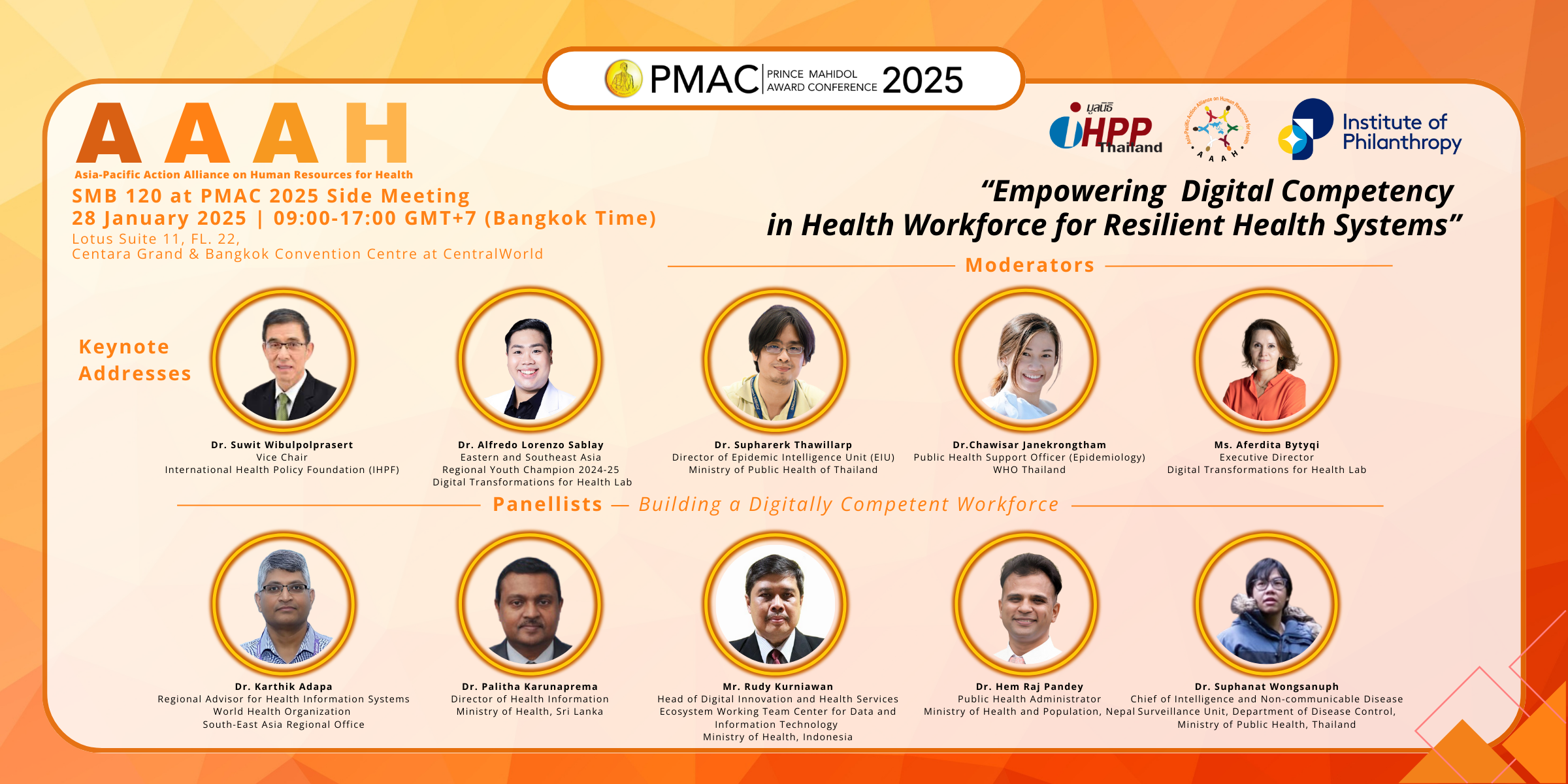Side Meetings
SMB120
Empowering Digital Competency in Health Workforce for Resilient Health Systems
28
Jan
- Asia-Pacific Action Alliance on Human Resources for Health (AAAH)
- Institute of Philanthropy

The health workforce in the Asia-Pacific region is facing growing challenges in the context of rapidly evolving digital tools and significant demographic shifts. With the approaching Prince Mahidol Award Conference (PMAC) 2025 and 2026, which will emphasise the impact of demographic transitions such as ageing populations, youth and workforce transitions, migration, urbanisation, and technological advancement, it is evident that health systems must evolve to adapt to these new realities.
As digital technologies like artificial intelligence (AI) continue to reshape healthcare, there is an urgent need for health workforces to not only keep pace but to be empowered with the skills and competencies required to harness these tools for better healthcare delivery. Health systems must embrace innovation and prepare the workforce for a future where digital tools play a critical role in response to public health emergencies and day-to-day health service delivery.
The 13th Asia-Pacific Action Alliance on Human Resources for Health (AAAH) conference, held in Lao PDR, explored the theme, "Building a Resilient Health Workforce and Preparing for Future Public Health Emergencies." The conference concluded with the crucial principle that competence paired with commitment (C + C = R) is the foundation of a resilient health workforce. Attendees emphasised the need for systemic change to effectively prepare the health workforce for public health emergencies across the Asia-Pacific region. Four key drivers were identified as essential for health system transformation: Data-driven, Digital-driven, Competency-driven, and Community-driven. These factors, referred to as the 2D and 2C models, highlight the need for health systems to integrate data, digital tools, competencies, and community engagement to drive effective change. With digital technologies like AI becoming more integrated into healthcare systems, there is a strong push for solutions that enhance the capabilities of the health workforce, particularly in primary healthcare settings.
A significant opportunity lies in the increasing presence of early-career health workers who have grown up in the digital age. Their familiarity with digital tools presents a dual opportunity and challenge. Their training and preparation must evolve to align with the digital transformation of healthcare, ensuring they are equipped to address both routine and emergency healthcare needs.
However, healthcare delivery in both urban and rural areas faces unique challenges when it comes to adapting to digital health solutions. These settings require tailored digital tools that cater to the specific needs of each community. A key factor in achieving health equity, particularly in underserved regions, is empowering health workers with digital literacy enabling them to understand and effectively use digital tools in their daily work.
As we build resilient health systems, competency-based training becomes essential to ensure health workers are prepared to respond effectively to emergencies. It is critical for the sustainable and efficient delivery of healthcare. Training that emphasizes both technical skills and digital competencies will ensure that health workers are capable of adapting to new technologies and meeting the evolving demands of the health sector.
By investing in the digital competency of health workers, we are not only addressing knowledge gaps but also ensuring the delivery of high-quality, equitable healthcare. This approach is fundamental to building a resilient health workforce, achieving Universal Health Coverage (UHC), and effectively responding to public health emergencies in the face of demographic transitions.
Building on the discussions from the 13th AAAH Conference, the side meeting will focus on exploring strategies, policies, and practical solutions to integrate digital competency into the health workforce.
-
Digital Competence Framework: Exploring frameworks that integrate essential digital tools and technologies for health workers to enhance their digital competencies in addressing demographic challenges and culturally specific needs in Asia-Pacific countries, ensuring that health services are relevant and effective for diverse populations.
-
Policy Alignment: Engaging in discussions on aligning policies across various countries and sectors to promote a cohesive strategy for developing a digital health workforce.
-
Digital Competency Strategy: Identifying strategies to facilitate the incorporation of digital competencies into health workforce development in Asia-Pacific nations.
-
Role of Youth: Exploring how the next generation of health workers can shape the future of digital health solutions, ensuring they are prepared to navigate the evolving healthcare landscape.

